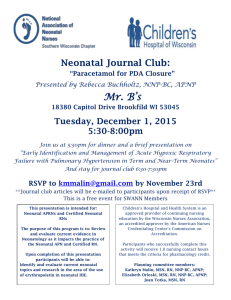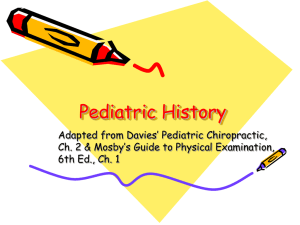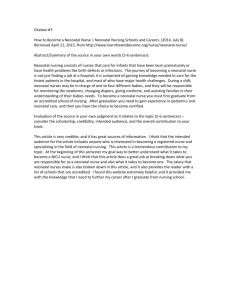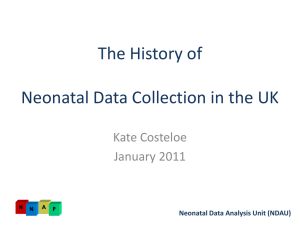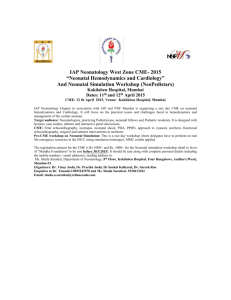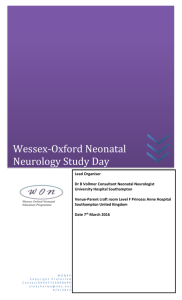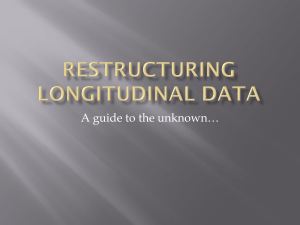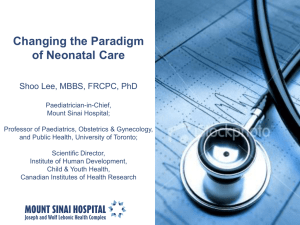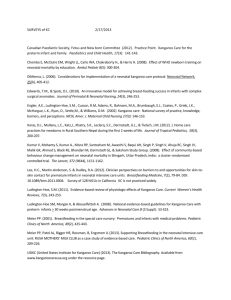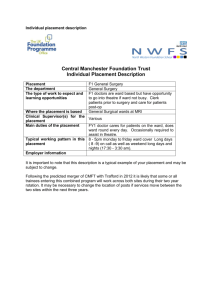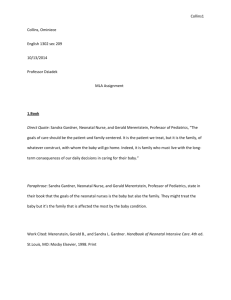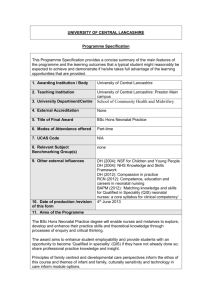NICU - Isle of Wight NHS Primary Care Trust
advertisement
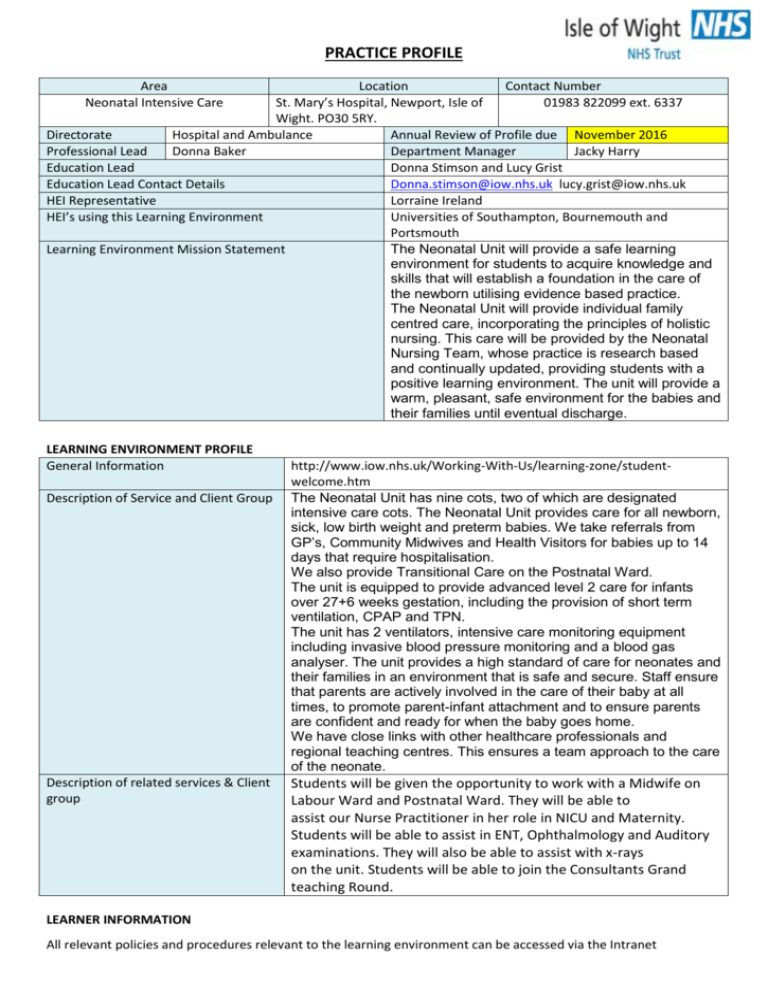
PRACTICE PROFILE Area Neonatal Intensive Care Location Contact Number St. Mary’s Hospital, Newport, Isle of 01983 822099 ext. 6337 Wight. PO30 5RY. Directorate Hospital and Ambulance Annual Review of Profile due November 2016 Professional Lead Donna Baker Department Manager Jacky Harry Education Lead Donna Stimson and Lucy Grist Education Lead Contact Details Donna.stimson@iow.nhs.uk lucy.grist@iow.nhs.uk HEI Representative Lorraine Ireland HEI’s using this Learning Environment Universities of Southampton, Bournemouth and Portsmouth The Neonatal Unit will provide a safe learning Learning Environment Mission Statement environment for students to acquire knowledge and skills that will establish a foundation in the care of the newborn utilising evidence based practice. The Neonatal Unit will provide individual family centred care, incorporating the principles of holistic nursing. This care will be provided by the Neonatal Nursing Team, whose practice is research based and continually updated, providing students with a positive learning environment. The unit will provide a warm, pleasant, safe environment for the babies and their families until eventual discharge. LEARNING ENVIRONMENT PROFILE General Information Description of Service and Client Group Description of related services & Client group http://www.iow.nhs.uk/Working-With-Us/learning-zone/studentwelcome.htm The Neonatal Unit has nine cots, two of which are designated intensive care cots. The Neonatal Unit provides care for all newborn, sick, low birth weight and preterm babies. We take referrals from GP’s, Community Midwives and Health Visitors for babies up to 14 days that require hospitalisation. We also provide Transitional Care on the Postnatal Ward. The unit is equipped to provide advanced level 2 care for infants over 27+6 weeks gestation, including the provision of short term ventilation, CPAP and TPN. The unit has 2 ventilators, intensive care monitoring equipment including invasive blood pressure monitoring and a blood gas analyser. The unit provides a high standard of care for neonates and their families in an environment that is safe and secure. Staff ensure that parents are actively involved in the care of their baby at all times, to promote parent-infant attachment and to ensure parents are confident and ready for when the baby goes home. We have close links with other healthcare professionals and regional teaching centres. This ensures a team approach to the care of the neonate. Students will be given the opportunity to work with a Midwife on Labour Ward and Postnatal Ward. They will be able to assist our Nurse Practitioner in her role in NICU and Maternity. Students will be able to assist in ENT, Ophthalmology and Auditory examinations. They will also be able to assist with x-rays on the unit. Students will be able to join the Consultants Grand teaching Round. LEARNER INFORMATION All relevant policies and procedures relevant to the learning environment can be accessed via the Intranet Work Pattern (Start, finish times) Dress Code Induction/Orientation programme Staff / rest room facilities Expectations during placement Long Day = 07.30 – 20.30 Early = 07.30 – 14.30 Late 14.00 – 20.30 Nights 20.15 – 07.45 http://intranet/guidelines/Dress%20Code%20and%20Uniform%20Policy.pdf Organisational induction by CET followed by local induction within clinical area We have a student pack which we are able to send out or can be collected by the Student. We prefer this to be accessed prior to attending for placement. We have a well-equipped staff room with a microwave and fridge for food storage. We also have a staff changing room and students have a locker available for security of their belongings. We expect all learners to abide by the Trust’s Policies and Guidelines. Students will work to the IOW NHS Let’s Show We Care philosophy. Students will contact NICU 2 weeks prior to placement to discuss their off duty and organise the receipt of the student induction pack which we expect students to have completed prior to joining us. Students are encouraged to question their mentors prior to carrying out procedures/and or giving advice. Thus ensuring safe practice. LEARNING OPPORTUNITIES & RESOURCES BAPM British Association of Perinatal Medicine www.bapm.org/ Recommended BLISS www.bliss.org.uk reading/Websites CEMACH Confidential Enquiry into Maternal and Child Health www.cemach.org.uk/ CESDI 2001 Perinatal Review Centre for Excellence in Teaching and Learning www.cetl.org.uk please access before placement Early Intervention The Next Chapter - http://www.dwp.gov.uk/docs/earlyintervention-next-steps.pdf Early Intervention. The next steps http://www.dwp.gov.uk/docs/early-interventionnext-steps.pdf - chapter 2 Institute of Child Health www.ich.ucl.ac.uk/ National Institute of Clinical Excellence www.nice.org.uk/ NPEU National Perinatal Epidemiology Unit www.npeu.ox.ac.uk/ Royal College of Obstetricians and Gynaecologists www.rcog.org.uk Royal Society of Paediatrics and Child Health (RCPCH) www.rcpch.ac.uk/ Stillbirth and Neonatal Death Society www.uk-sands.org/ The Neonatal Nurses Association www.nna.org.uk UNICEF UK Baby Friendly Initiative www.babyfriendly.org.uk Working together to safeguard children https://www.education.gov.uk/publications/standard/publicationdetail/page1/DCSF00305-2010 - chapter 1 Working together to safeguard children Common Abbreviations These will be covered during placement. Specific learning opportunities Students will have access to other areas of learning such as -: Labour Ward Postnatal Ward Shadowing the Advanced Neonatal Nurse Practitioner Assist with Transitional Care Assist with NICU clinic/tongue tie clinic Observe an antenatal scan Observe a head ultrasound Observe hearing screening Observe an eye examination Breastfeeding & Baby Friendly Initiative Breast Feeding Course (if available during placement) Early Years Intervention/Safeguarding Participation in local/national ongoing clinical audit Spend time with breastfeeding specialist nurse. All relevant policies and procedures relevant to the learning environment can be accessed via the Intranet Specific areas of expertise/clinical skills Common Assessments / Interventions/Care pathways Models of practice experience e.g Hub and Spoke, Care pathways, Patient Journeys Basic care of a baby in a cot/incubator, drug calculations, fluid regimes, breast feeding, bottle feeding and preparation, passing naso-gastric tubes and tube feeding, head ultrasounds, cannulations, placement of arterial lines, placement of long lines, X-Rays, heel prick blood testing, IM injections, IV drug administration, phototherapy, blood transfusions. We deal with the assessment and care of conditions such as hypoglycaemia, hypothermia, sepsis, jaundice, respiratory problems, feeding issues, prematurity, low birth weight babies, difficult deliveries and safeguarding issues. This is not an exhaustive list. Gibbs’ Reflective cycle 1984. Roper, Logan and Tierney Model of Nursing including Activities of Daily Living. We employ many care pathways since our client group is diverse, these will become clear during placement. MULTIAGENCY LEARNING OPPERTUNITIES / RESOURCES Multiprofessional learners accessing Nursing students, Midwives, Medical students. the environment Advanced Neonatal Nurse Practitioner, Neonatal Nurse Specialists, Neonatal Professionals working in the Staff Nurses, Midwives, Neonatal Nursery Nurses, HCA’s, Consultant environment Opportunities to meet EU directives (Nursing) Paediatricians, Associate Specialists and SHO’s. Working within an acute setting. Attending outpatient clinics to see the “well-baby” and assess development. Working with parents and helping them to develop the skills needed to care for their baby’s health needs. All relevant policies and procedures relevant to the learning environment can be accessed via the Intranet
